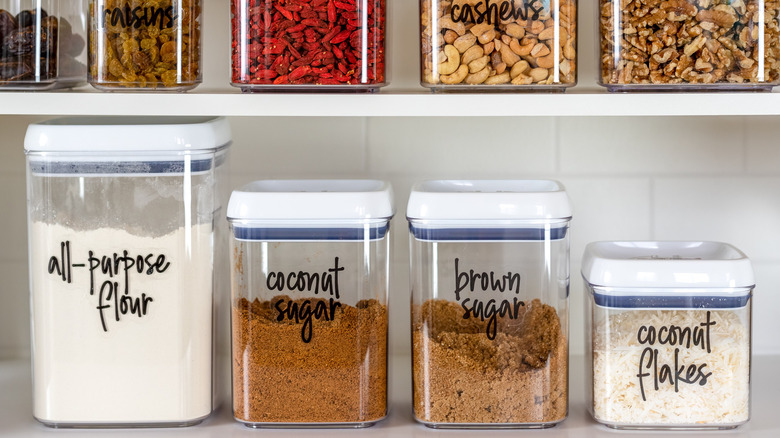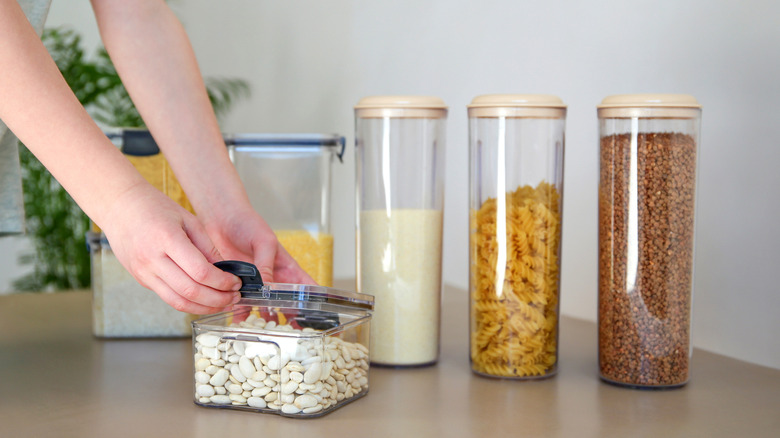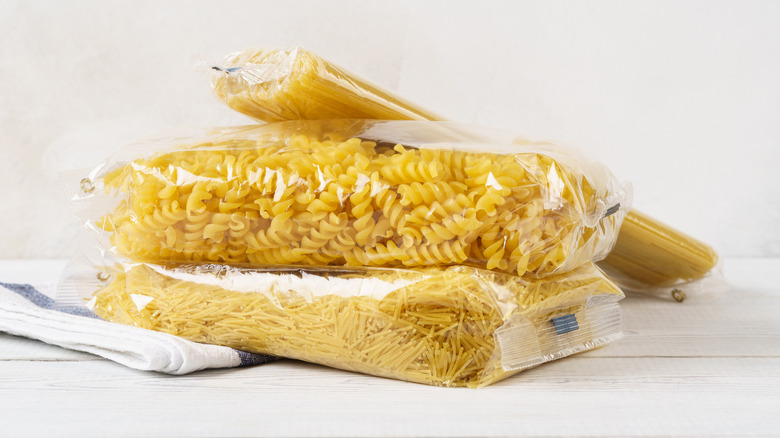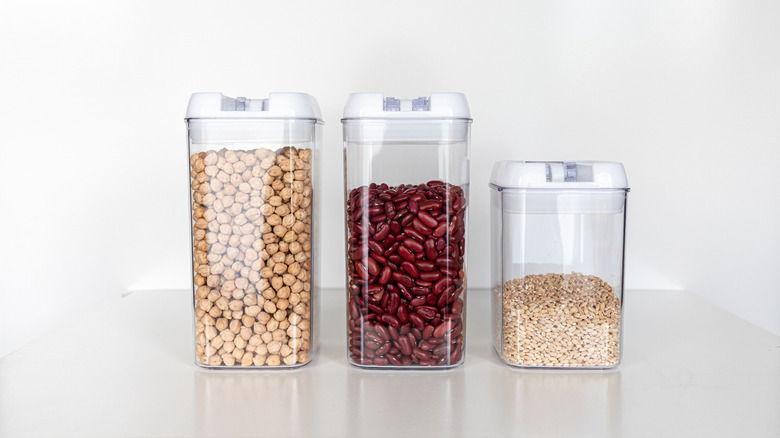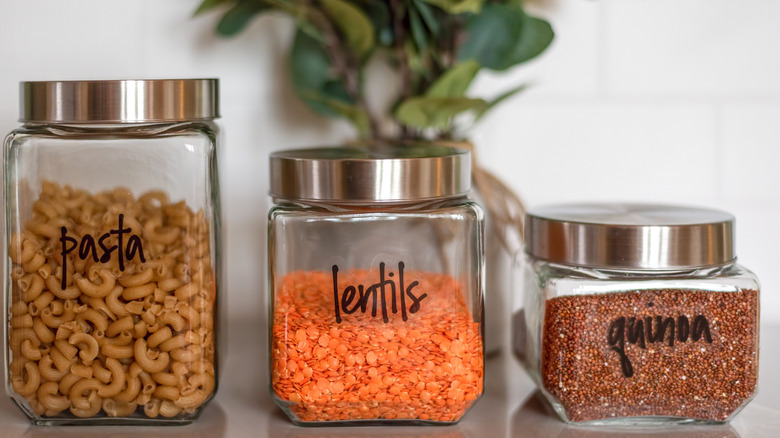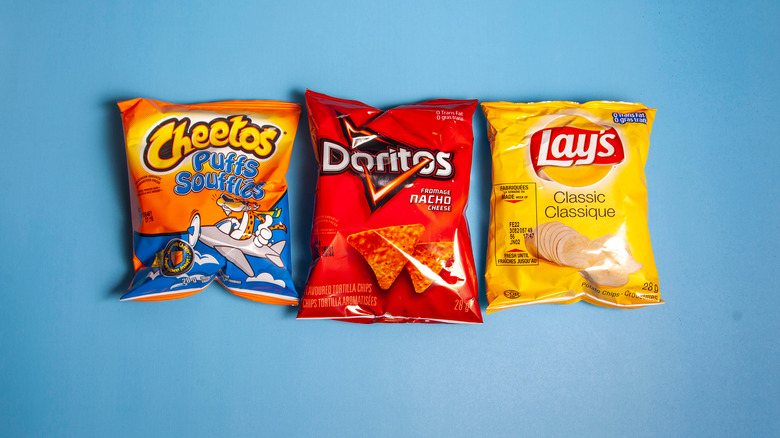What Is Decanting And Why You Should Use It To Get More Organized
The word decant may conjure a vision of red wine being poured into a beautiful vase-like carafe. While it's true you may have a decanter or two tucked away in a cluttered kitchen cabinet, your home may benefit from a different type of decanting.
If you're a fan of decluttering and organizing, the chances are that you've seen pantries, laundry rooms, and even bathrooms full of clear containers with individual items tucked inside. According to Abby Organizes, the idea is to save space and time by removing bulky boxes or packaging, which allows you to see exactly what you have in stock. This, in turn, can also lead to saving money since you won't feel the need to buy more than, well, you need.
Even the organizing guru herself, Marie Kondo of Konmari, likes to repurpose old food jars to store small items in her home. Whether you want to go the repurposing, eco-friendly route or use store-bought organizers is up to you. Ahead, you'll find out what exactly decanting is in the organizing world, how to do it, and when it's okay to skip it.
What is decanting and why is it helpful?
For the purpose of organizing, the verb decant is defined as to pour from one vessel into another, according to Merriman-Webster. The idea is to take individual items that come in cumbersome containers and empty them into something more space-saving — think the heavy bags of sugar you stuff high on a pantry shelf or the awkward Q-tip boxes you shove into your bathroom drawer. Decanting powdered sugar and cotton swabs can make your overall life easier and your home much more organized.
As for the benefits, Simplify 101 mentions that you'll save room in your cabinets and on your shelves, along with your hard-earned time and money. It's much easier to see exactly what you have so you can reach for it faster and refill only when necessary. Bulk buyers in particular can see an added advantage. By shedding the original packaging as you decant into clear organizers, you very well may need to take fewer trips to the store for more, contributing to less environmental trash.
What can you decant?
The kitchen is the place where you'll most often see items decanted. Not only do matching, organized, and labeled containers make for a pretty pantry, but they also keep food from getting stale and make meal prep a breeze, according to AllRecipes.
Dried goods such as pasta, rice, beans, and baking powders are some of the best things to decant. In addition, consider decanting snacks or toppings that aren't as frequently used but you'd like to keep fresh for a long time, such as popcorn kernels, nuts, granola, seeds, and chocolate chips. Add a scoop inside the container so measuring for smoothies and brownies can be done in no time. As Style Degree notes, a quick scan of the clear jars before running to the grocery store or placing your order is all you'll need to know in order to update your list.
For anywhere else in the house, think about what you reach for on a daily basis that would be easier to grab from a lidded jar rather than its original packaging. Floss sticks and cotton rounds can sit in a jar on the bathroom countertop alongside hair ties and bobby pins. They're kept contained, free of dust, and, just like in the pantry, visible so you know when it's time to purchase more.
What are the best containers to use for decanting?
By now, you've probably gathered that clear containers are the way to go when it comes to decanting. That's because it gives the ability to determine how much of something is left. Even if you don't particularly like the see-through trend or having visual clutter, most of the time, these things will be hidden behind cabinet doors.
For any food, you'll want to be sure that the container is airtight to preserve freshness. Also, it's best to use the correct size for what you're storing. OXO, one of the most well-known makers of airtight food containers has a line that fits pantry goods in amounts as small as 0.2 quarts or as large as six quarts and everything in between. In addition, many of these types of jars are meant to stack on top of one another, making the most out of the space in your kitchen cupboards.
Non-perishable things around your house can be decanted into any clear containers you can find. Pull a Marie Kondo and clean out old jars to be reused or scour your local home goods store or antique shop for a unique find to place on your countertop. Just ensure they have a lid so that whatever you're storing stays clean and lint-free.
How to label decanted items
For anything obvious and non-perishable, feel free to skip the labels. Unless you just like the look of them, then you have permission to go all out. It may even help the not so organized household members think twice before refilling something where it doesn't belong according to the label maker company, Cricut.
Labeling comes in handy for things that are hard to tell apart such as the regular pasta from the gluten-free. Dry erase or chalk markers are acceptable, especially if you're swapping out the contents often. But be aware that they can rub off when handled. Vinyl labels, on the other hand, are high-end and semi-permanent. If you want a quick fix, stick to simple tape from a label maker.
An often voiced concern about decanting is how to tell when the expiration date is and what the instructions are if it's not something you know from memory. The trick is to put the expiration date somewhere discreet such as the back or the bottom of the jar using a sticker or paint pen. While eating expired pantry goods isn't necessarily bad for you, according to the USDA, you won't necessarily enjoy the taste. Instructions, including the cooking time, can be cut directly out of the box or bag and taped to the back of the container using plain scotch tape.
What shouldn't be decanted
While it's easy to get swept up in a home organizing journey, there's no need to go overboard with decanting everything you own according to Kitchn. Some things are perfectly fine to keep in their original packaging and, besides, containers can add up so only work with what's in your budget.
With that said, you shouldn't waste time decanting the things that you go through very quickly. Whether that be the chips or the cookies, spending time every few days to refill might feel more like a hindrance than a help for your busy life. What you can do instead is use a few bins to sort out salty, sweet, and on-the-go snacks and place the original packages in them for easy grabs. For individually wrapped breakfast bars and fruit snacks, consider pouring them from the original box into a bin to save space.
If you have extra of something that you decanted, reserve a high shelf in the pantry or linen closet to store the backstock. Or consider swapping out for a larger container if it's something you know you'll keep around in the house for a long time to come.
